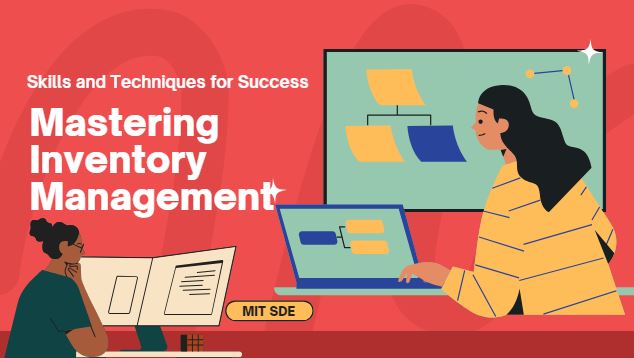
Introduction: The Importance of Inventory Management
In today’s fast-paced business world, effective inventory management is crucial for the success of any organization. Whether you’re a student pursuing a career in this field or a working professional aiming to enhance your skills, understanding the various inventory management techniques and skills is essential. This blog post will explore the critical aspects of inventory management, including the benefits of pursuing a postgraduate diploma in material management and the best material management courses available.
What is Inventory Management?
Inventory management oversees and controls the flow of goods and materials within an organization. It involves tracking stock levels, ordering new supplies, and ensuring that the right products are available at the right time and in the right quantities. Effective inventory management is crucial for maintaining smooth operations, reducing costs, and meeting customer demands.
Critical Skills for Successful Inventory Management
1. Analytical Thinking
One of the most critical skills for inventory managers is analytical thinking. This involves:
- Analyzing data to identify trends and patterns
- Making informed decisions based on historical data and forecasts
- Identifying areas for improvement in the inventory management process
Developing strong analytical skills is a crucial focus of many PG diplomas in material management programs, as it forms the foundation for effective decision-making in inventory management.
2. Attention to Detail
Inventory management requires a keen eye for detail. This skill is crucial for:
- Maintaining accurate records of stock levels
- Identifying discrepancies in inventory counts
- Ensuring proper labeling and organization of goods
Students pursuing a pgdm material management degree often receive extensive training in developing their attention to detail, as it’s a critical skill for success in the field.
3. Technology Proficiency
In today’s digital age, inventory management software and technology proficiency is essential. This includes:
- Understanding and using Enterprise Resource Planning (ERP) systems
- Familiarity with barcode scanners and RFID technology
- Ability to work with data analytics tools
The best material management courses incorporate hands-on training with various inventory management technologies to ensure students are well-prepared for the modern workplace.
4. Communication Skills
Effective communication is vital in inventory management, as it involves coordinating with various departments and stakeholders. Strong communication skills help in:
- Collaborating with suppliers and vendors
- Reporting inventory status to management
- Addressing customer inquiries about product availability
Many postgraduate diploma in material management programs include modules on business communication to help students develop these crucial skills.
5. Problem-Solving Abilities
Inventory managers often face challenges that require quick thinking and creative problem-solving. This skill is essential for:
- Resolving stock discrepancies
- Managing unexpected fluctuations in demand
- Optimizing storage and distribution processes
Developing problem-solving solid skills is a crucial focus of the best PG diploma in material management programs, preparing students to handle real-world challenges effectively.
Essential Inventory Management Techniques
ABC Analysis
ABC analysis is a fundamental technique taught in material management courses. It involves categorizing inventory items based on their importance and value:
- A items: High-value products that require close monitoring
- B items: Moderate-value products with average importance
- C items: Low-value products that require less frequent monitoring
This technique helps managers focus on the most critical inventory items, optimizing resource allocation and improving overall efficiency.
Just-in-Time (JIT) Inventory
JIT is a popular inventory management technique that aims to reduce waste and improve efficiency by ordering and receiving inventory only as it’s needed. Key aspects of JIT include:
- Maintaining minimal inventory levels
- Close coordination with suppliers
- Rapid response to changes in demand
Students pursuing a pgdm material management degree often study JIT in-depth, as it’s a widely used technique in modern manufacturing and retail environments.
Economic Order Quantity (EOQ)
EOQ is a calculation used to determine the optimal order quantity that minimizes total inventory costs. This technique considers:
- Ordering costs
- Holding costs
- Annual demand
Understanding and applying EOQ is a crucial skill taught in postgraduate diplomas in material management programs, as it helps organizations balance inventory levels and costs effectively.
Lean Inventory Management
Lean inventory management minimizes waste and maximizes efficiency throughout the supply chain. Key principles include:
- Eliminating non-value-added activities
- Continuous improvement of processes
- Empowering employees to identify and solve problems
Many of the best material management courses incorporate lean principles, as they’re widely applicable across various industries and can significantly improve inventory management practices.
The Value of a Post-Graduate Diploma in Material Management
Pursuing a PG diploma in material management can provide numerous benefits for students and working professionals looking to advance their careers in inventory management. Some key advantages include:
- Comprehensive Knowledge: These programs offer in-depth knowledge of inventory management techniques, theories, and best practices.
- Practical Skills: The best PG diploma in material management programs provides hands-on experience with industry-standard software and technologies.
- Networking Opportunities: Students can connect with industry professionals and peers, building valuable relationships for future careers.
- Career Advancement: A postgraduate diploma can open doors to higher-level positions and increased responsibilities in inventory management roles.
- Industry Recognition: Many pgdm material management programs are recognized and valued by employers, giving graduates a competitive edge in the job market.
Choosing the Best Material Management Course
When selecting a material management course or program, consider the following factors:
- Curriculum: Look for programs that cover a wide range of inventory management techniques and skills.
- Faculty: Research the qualifications and industry experience of the teaching staff.
- Industry Partnerships: Programs with solid industry connections often provide better internship and job placement opportunities.
- Technology Integration: Ensure the course includes training on modern inventory management software and tools.
- Accreditation: Choose programs that are recognized by relevant professional bodies or accreditation agencies.
Conclusion: Embracing the Future of Inventory Management
As businesses continue to evolve and face new challenges, the importance of effective inventory management will only grow. By developing key skills and mastering essential techniques, professionals in this field can play a crucial role in driving organizational success.
Whether you’re considering a post graduate diploma in material management or looking to enhance your existing skills, investing in your inventory management knowledge is a smart career move. With the right combination of education, practical experience, and continuous learning, you can position yourself as a valuable asset in the ever-changing world of inventory management.
Remember, the best material management course is one that not only provides theoretical knowledge but also equips you with practical skills and industry insights. By choosing a program that aligns with your career goals and industry trends, you’ll be well-prepared to tackle the challenges and opportunities in the exciting inventory management field.


